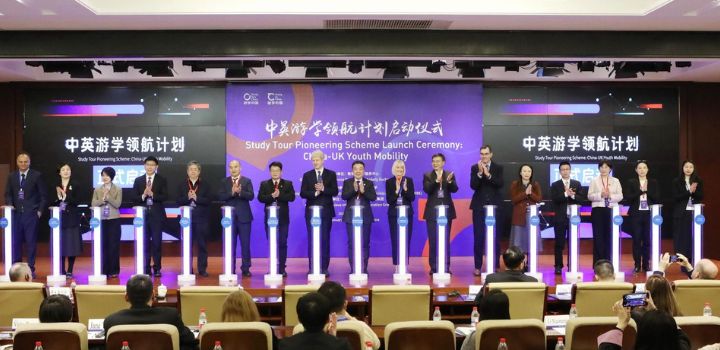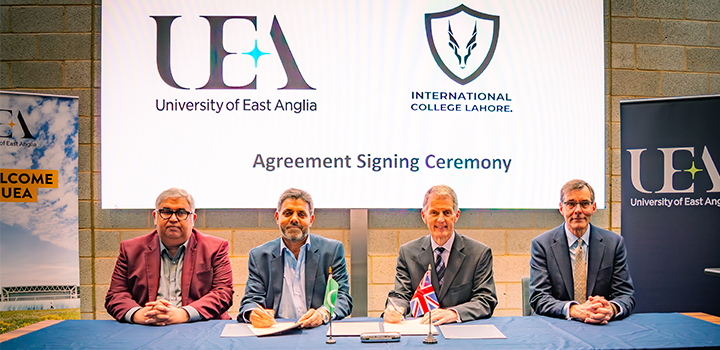Mentees to mentors: Supporting girls and non-binary students in Computing Sciences
By: Communications

In 2021, according to analysis reported by FFT Education Datalab, the A-level subject with the highest level of disproportionality by gender was Computer Science, at 85% male.
At UEA, which currently has around 10-12% female and non-binary students within Computing Science, an innovative programme called Big Sister Little Sister (BSLS) is aiming to address this imbalance through school outreach, and by fostering a more supportive environment in higher education.
Second-year UEA Computing Science students, Nithya Vinaitheerthan from Hertfordshire and Joy-Moriah Balenthiran from Berkshire, spoke to us about their involvement with the Big Sister Little Sister programme, what interests them about the subject, and their hopes for the future.
What first got you interested in computing, and what keeps you motivated to study it?
N: I study Computer Systems Engineering, which is a more hardware-oriented stream. What drew me in was the integration of hardware and software, and how versatile the field is. You can work across industries – medical robotics, aerospace, healthcare. These areas really inspired me. I want to contribute to pushing humanity forward with technology.
J: At first, I wasn’t sure about specific fields, I just knew I liked tech. I helped people with tech problems growing up and loved gaming, so Computing Science felt like the natural choice. Now, I’m really passionate about AI and how it can learn from data to solve real problems. I’d like to spend time in research before moving into industry.
What’s one myth about computing you’d like to bust?
N: That it only leads to a 9-to-5 corporate job.
J: Or that it’s just coding. There are so many roles – analysts, project managers, quality assurance – that don’t require constant coding. People often overlook how broad the field is.
You’re both mentors in the Big Sister Little Sister programme. What motivated you to join?
N: I wanted leadership experience and a chance to give back. I remember how lost I felt at the start – there are so many paths in Computing Sciences, and a lot of it is self-taught. Helping others through that and exchanging ideas is very rewarding.
J: For me, it was about supporting women in tech. In first year, the gender imbalance was stark, and it could feel isolating. I wanted to help make tech feel more accessible and inclusive. Plus, I enjoy mentoring and building community.
What’s been the most rewarding part so far?
N: Interacting with like-minded women and non-binary students. It challenges my perspectives and helps me grow. Also, when someone says they feel more welcome or learned something meaningful, it makes it all worth it.
J: It creates a safe space where people can connect, ask for study partners, or seek support. Just seeing those organic interactions makes it feel impactful.
Have there been standout moments where you felt a real difference was made?
J: We have a group chat where people regularly reach out for help or to form study groups. It shows how the programme has become a reliable, safe space. That sense of belonging matters a lot.
N: In first year, I started a discussion on quantum computing and space exploration. We bounced ideas off each other and realised how vast Computing Science really is. We also had a mentor session with a professor on building portfolios and planning career paths. These events created real value.
Are there common challenges that come up in the group?
N: Being heard in group discussions, especially when you’re the only woman, is a big one. It’s not always intentional, but it’s hard to be taken seriously sometimes.
J: Yes, it leads to imposter syndrome. People start doubting themselves, thinking their ideas aren’t good enough, when in fact it’s the environment that’s lacking. We’d love to raise awareness among the wider student body, not just within BSLS.
Has mentoring improved your own confidence or skills?
N: Definitely. Planning and running events have improved my leadership and resilience, and taught me how to stay calm and solve problems under pressure.
J: Same here, leadership and management skills especially. We also learned to be empathetic and validate people’s feelings. My communication skills have really grown.
What would you change about how computing is perceived in schools?
N: The stereotypes. People assume you’ll end up in a dull corporate job, or that only a certain type of person fits in. I used to think that too.
J: There's a myth that computing is oversaturated or limited to one role, but new jobs are emerging all the time. I’m currently on a placement with the police, analysing digital evidence, which is something I never imagined I could do before.
Do you think AI or other emerging technologies will affect gender diversity?
N: AI alone won’t, but if used strategically, it can. Ethical use and proper regulation are key. There’s a lot of fear, especially with things like deepfakes, and that affects how safe people feel.
J: AI depends on the data it’s trained on. If that data reflects inequality, it’ll reinforce it. We need diverse, representative data to avoid repeating history.
If you could give advice to your younger self or someone considering computing, what would it be?
N: Persevere. Stay adaptable and proactive. The field evolves quickly, so you can’t stay still.
J: Find your own purpose. Don’t just follow the crowd – make an impact that’s meaningful to you.
If you are looking to start university in September 2025 and are still thinking about your options, consider joining a UK Top 25 university this September through Clearing
Find out more about Clearing and view available courses
Related Articles

UEA strengthens academic relations through new study scheme
The University of East Anglia has joined a major new initiative designed to boost cultural and academic exchange between students in China and the UK.
Read more
Indian and UK institutions unite to strengthen cybersecurity education in India
A UK-India partnership aiming to train 100 faculty members on advanced cybersecurity topics, will focus particularly on female staff in tier-2 cities to become catalysts for change in their institutions and communities.
Read more
University of East Anglia announces strategic partnership with International College Lahore
The University of East Anglia (UEA) is proud to announce a new international partnership with International College Lahore (ICL), a pioneering higher education institution being established in Pakistan.
Read more